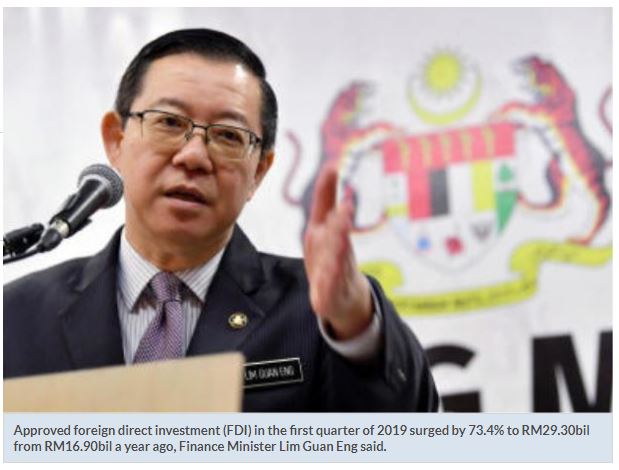Malaysia: Approved FDI in Q1 up 73% to RM29.3b, says Guan Eng
KUALA LUMPUR: Approved foreign direct investment (FDI) in the first quarter of 2019 surged by 73.4% to RM29.30bil from RM16.90bil a year ago, Finance Minister Lim Guan Eng said.
He said on Thursday the increase was underpinned by a 127% manufacturing investment, which surged to RM20.2bil, compared with RM8.9bil a year ago.
“Out of the RM20.2bil in approved manufacturing FDI, RM11.5bil came from the US, RM4.4bil from China and RM2.2bil from Singapore,” he said in a statement.
He pointed out the notable approvals were for Micron Technology and Jabil Circuit, which were undertaking high-quality investment to expand their operations in Penang.
“The RM29.3bil worth of overall approved FDI is expected to create more than 41,200 jobs for Malaysians, of which 22,970 employment opportunities would be in manufacturing and 18,000 jobs in the services,” he said.
Lim said with a competent government at the helm, Malaysia is capitalising on its competitiveness within the global supply chain to become one of the top preferred safe havens in the region.
“Malaysia is reaping benefits from business relocation as well as trade and investment diversions caused by the trade war between China and the US.
“As a result, FDI into Malaysia has increased drastically. Additionally, industrial production growth in April 2019 has accelerated to a six-month high amid an environment of low and stable inflation. These developments offer further hints of a healthy second quarter GDP growth,” he said.
Lim also pointed out April 2019 industrial production growth accelerated to 4.0% year-on-year from 3.1% in March.
The industrial growth was supported by robust manufacturing growth and mining output recovery.
“The 4.0% April industrial expansion is the strongest in six months and it is above market consensus, which was 2.5% according to Bloomberg.
“In March 2019, industrial production growth of 3.1% also came above market expectations of 2.3% based on a Bloomberg survey,” he said.
Lim pointed out the April 2019 industrial expansion occurred during a period of low and stable inflation of 0.2%.
Prices of some basic consumer items have fallen due to multiple factors, including the shift in the taxation regime from the burdensome goods and services tax (GST) to sales and service tax (SST), and the imposition of price ceilings on RON95 and diesel.
In February 2019, the price ceiling of RON95 was reduced from RM2.20/litre to RM2.08/litre.
Source: https://www.thestar.com.my/business/business-news/2019/06/13/approved-fdi-in-q1-up-73pct-to-rm29pt3b-says-guan-eng/#iMGY8QoXc66zZM25.99


 English
English




